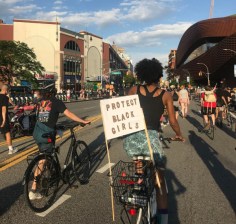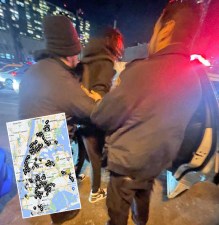Sidewalk Biking Enforcement and NYC’s New Criminal Justice Reforms
The City Council just passed a package of bills — collectively known as the Criminal Justice Reform Act — encouraging police officers to issue civil instead of criminal summonses for “quality-of-life” offenses like possessing an open container of alcohol or littering. Sidewalk biking wasn’t one of the offenses included in the bills, but a reform NYPD made to its enforcement of sidewalk cycling appears to have served as a proof of concept for the rest of the package.

Spearheaded by Council Speaker Melissa Mark-Viverito, the legislation aims to reduce NYPD’s issuance of criminal summonses that have disproportionately penalized communities of color for minor offenses. By issuing civil instead of criminal summons for transgressions like public urination, possession of an open container of alcohol, littering, excessive noise, and violating park rules with civil penalties instead of criminal summonses, the intent is to reduce the severe impact of enforcement.
While council members had initially hoped to eliminate criminal penalties for these offenses altogether, the version of Intro 1057-A passed today requires NYPD to develop guidelines dictating when to apply civil or criminal summonses for each offense. The bill states that the City Council has “concluded that criminal enforcement of these offenses should be used only in limited circumstances.”
A major impetus for the reforms is the disproportionate impact that enforcement of those five offenses has carried in communities of color. Sidewalk biking has historically been enforced in much the same way. A 2014 study showed that from 2008 to 2011, 12 of the 15 NYC neighborhoods where police issued the most sidewalk biking summonses were majority black or Latino.
“There’s been inequitable enforcement of cycling on the sidewalk,” said attorney and bike law expert Steve Vaccaro. “They haven’t been going after senior citizens on the Upper West Side the same as they go after young black men in East New York.”
Subdivision “b” of Section 19-176 of the city’s administrative code levies a maximum civil penalty of $100 for biking on the sidewalk. But subdivision “c” spells out a misdemeanor variation when someone bikes on the sidewalk in a “manner that endangers any other person or property” — and that carries a maximum penalty of 20 days in jail.
Those charges are often dismissed in court, but taking time off from work to appear in court is especially burdensome for low-income New Yorkers. Failure to pay fines or show up to trial for a criminal summons can result in jail time for the offender. An open warrant for failure to appear in court can also be a barrier to employment.
While the City Council legislation doesn’t address sidewalk biking enforcement, summonses have already declined significantly since 2014. That year the city began issuing most sidewalk biking tickets as moving violations.
The city issued 21,187 criminal summonses for sidewalk biking in 2013, according to data compiled by the NYPD. That number declined more than 80 percent to 3,845 in 2014, according to the Criminal Court of the City of New York’s annual reports. The number of moving violations increased only marginally in the same time frame. Full data from 2015 is not yet available.
The shift in enforcement of sidewalk biking violations appears to have been a model for both the NYPD and the City Council in developing today’s legislation.
In January, when NYPD officials testified on the original proposals, Mark-Viverito cited sidewalk biking as an example of how changing guidelines can lead to a shift in officers’ enforcement practices. “We know that the policy has graduated, you know, in terms of the enforcement for biking,” she said.
At the same hearing, Elizabeth Glazer of the Mayor’s Office of Criminal Justice also cited the shift in sidewalk biking enforcement as a model for the legislation. “Adding options to police officers will permit them to calibrate their response to the offense that’s in front of them and to lighten the touch where that’s appropriate,” Glazer said.

